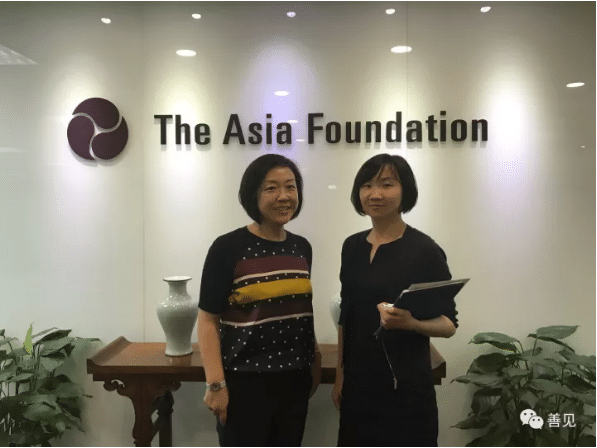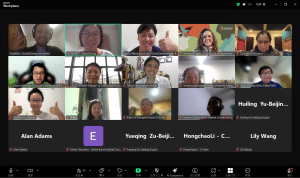Editor’s Note

Introduction
The Law of the People’s Republic of China on Administration of Activities of Overseas Non-governmental Organizations in the Mainland of China (ONGO Law) came into effect on January 1st 2017, and since then, its implementation has garnered significant attention from ONGOs and other stakeholders. In the past months, many ONGOs have successfully registered their representative offices with public security departments across the country. The successful registration of representative offices is a joint effort relying on the cooperation of many forces.
The Asia Foundation’s Story in China
Q: What is TAF’s story in China? When and why did TAF come to China? How does its mission in China relate to the general mission of TAF?
A: 1. The Asia Foundation is a nonprofit international development organization. Our work across the region addresses five overarching goals—strengthen governance, empower women, expand economic opportunity, increase environmental resilience, and promote regional cooperation.
2. After the establishment of China-US diplomatic relations in January 1979, The Asia Foundation consulted widely, trying to find a foothold for carrying out our projects in China. In September 1979, the State Scientific and Technological Commission (present name: the Ministry of Science and Technology) held the first conference about the impact of information technology on China’s future economic development. Entrusted by the State Scientific and Technological Commission, The Asia Foundation invited 9 international computer experts to attend the conference as foreign experts. After arriving in Beijing, with the recommendation from the State Scientific and Technological Commission, The Asia Foundation held both formal and informal talks. The Chinese side brought up project ideas that they hoped The Asia Foundation could support, including holding the second information technology conference the next year in the U.S.
Shortly after that, in February 1980, Dr. Hayden Williams, the president of The Asia Foundation at that time, was invited by the Ministry of Foreign Trade and Economic Coopertation (present name: the Ministry of Commerce), and came to Beijing to discuss project cooperation in details. He had extensive and in-depth communication with the Ministry of Foreign Trade and Economic Coopertation, University of International Business and Economics, Ministry of Foreign Affairs, and China Foreign Affairs University. Our earliest projects include diplomat-training projects, book donation projects, etc., in response to China’s need for opportunities to study in the U.S., obtaining more English materials and learning advanced technology. In 1994, as the number of our projects in China increased, we set up a Beijing office and hired our first local employee.
3. Today, our work in China remains as relevant as ever with initiatives around regional cooperation and U.S.-China exchange, disaster management, charity sector development, child welfare and protection, women’s development and gender equality, and poverty alleviation and reduction. The Foundation also continues to support Chinese international development efforts that are sustainable, informed by international practices, and responsive to local needs.
Q: What are some of your proudest projects in China? What are some major milestones that TAF has achieved over the years in China?
A: The Asia Foundation has had many achievements during almost 40 years of work in China. The followings are a few examples:
1. Facilitate cooperative relations and non-governmental exchange between the United States and China:The Asia Foundation has worked with universities and research institutions to promote the development of bilateral relations through inter-organizational communications and seminars.
2. Provide hundreds of scholarships, grants and other opportunities to study overseas, to help China enhance its management capacity in the fields of diplomacy and international economic relations.
3. Support the development of China’s charity sector: supporting the development of China’s charity sector is one of the key program fields of The Asia Foundation. With China’s national Charity Law coming into force, the Foundation will continue to support the research and training on supporting policies to promote the effective implementation of the Charity Law.
4. Help China enhance its capacity in disaster preparedness and disaster management: For over a decade, The Asia Foundation has teamed with Chinese partners to enhance China’s capacity in community-based disaster preparedness and natural disaster response.
5. Enhance the response mechanisms to domestic violence against children: Together with our Chinese partners, we promote multi-sector collaborations on child welfare and protection, and provide suggestions and recommendations for the development of China’s child protection system.
6. Support poverty alleviation or reduction of migrant women: during the past 20 years, our projects have assisted more than one million migrant women, who came from more than 20 provinces across the country, to improve their economic conditions, obtain social services and integrate into the local communities.
7. Book donation: Our “Books for Asia” project has donated around 4 million quality English books to more than 700 higher education institutions in China.
8. Support China’s global engagement: We work with Chinese universities, think tanks, businesses, non-governmental organizations (NGOs), and government agencies on programs that advance the capacity of Chinese NGOs to respond to development challenges in Asia. The Asia Foundation also considers promoting international development collaborations as one of its future work priorities.
Pre-ONGO Law
Q: What was The Asia Foundation’s legal status before the ONGO Law? Did The Asia Foundation endure any extra scrutiny because of its legal status before?
A: 1. Before the promulgation of the ONGO law, The Asia Foundation did not have a legal entity in China. Although there was no formal registration status, we maintained close ties with the Chinese government departments. From 1979 when we first came to China, to 1994 when we set up an office in China, and then throughout these years of carrying out our projects in China, we regularly communicated with relevant departments to report on the work of our projects and the overall operation of our office.
2. Compliance to the relevant regulations has always been a significant goal of our work. Especially after the promulgation of the “Regulation on the Administration of Foundations”, we had communication with the relevant departments, and some departments actively helped us to coordinate, trying to find a supervisory department. But none of these efforts came into fruition.
3. Because we were not able to officially register, we encountered some difficulties in our work. There were many problems that need to be coordinated with a great deal of time and energy, such as the cooperation with Chinese partners and obtaining visas for our foreign staff. So the promulgation of the law is indeed a good thing for us. It is the first law that China has to define and regulate overseas NGOs like us that carry out activities in China, so it has become a channel that gives us clear guidance on our registration. From this perspective, this law has tremendous significance. It marks the beginning of a new era for the communication and cooperation between overseas NGOs and China.
Q: How closely did you follow the development of the ONGO Law? Have you ever submitted legislative opinions or suggestions to the relevant authorities on the law?
A: We watched closely the development of the ONGO Law. We were very pleased when we saw that the draft of the law was released on the website of the National People’s Congress to collect public opinions, because we believe that it would have a positive impact on the perfection of the law if there could be more inputs and views from stakeholders and the public. We valued the opportunity to submit our opinions. We communicated several times with the headquarters, and then we submitted feedback in the name of The Asia Foundation.
Registration Process
Q: How did you start preparing for your registration? How did you establish contact with relevant departments?
A: 1. Right after the implementation of the law starting on January 1, 2017, we started our registration process. Our headquarters was very supportive for our registration work. Our president came to China and met with the relevant departments to discuss the registration, introducing in detail the efforts and contribution that The Asia Foundation has made for China’s development for all these years.
2. At the same time, we strengthened our communication with the Beijing Municipal Public Security Bureau, who was in charge of the registration. In our whole registration process, they provided clear direction and guidance regarding our registration application. Their attitudes were conscientious and patient and they responded our staff’s specific questions in a timely manner. At the certification ceremony, we gave them a silk banner that wrote: “warm and efficient, open and pragmatic”. I think these four words are a good summary of the work attitude of the ONGO Management Office at the Beijing Municipal Public Security Bureau, based on our experience in the registration process. If there were not their open and pragmatic spirit, or their enthusiastic and efficient work, we wouldn’t have come to where we are today. After the Chinese People’s Association for Friendship with Foreign Countries (CPAFFC) was included in the list of Professional Supervisory Units (PSUs) for ONGOs, we proactively communicated with the CPAFFC. Our work scope has a lot of overlap with that of the CPAFFC. We are very pleased to have CPAFFC as our PSU.
3. Throughout the preparation process, I think that efficient and honest communication, with both the PSU and the public security departments, is very important. In addition to the fact that the colleagues in our Beijing office who were responsible for the registration and I myself maintained communication with the relevant departments, we also mobilized The Asia Foundation Board, former trustees, and the headquarters’ leadership, by using their trips to China to set up relevant meetings. Every time before we met with the relevant departments, we made a lot of preparation, including compiling materials such as brochures and CDs that demonstrate our achievements and contributions in China throughout so many years.
Q: How did you find your Professional Supervisory Unit (PSU)?
A: Because of the broadness of our work field, finding a suitable PSU was the greatest challenge that we faced during the registrationm process. We watched closely on the list of PSUs. When we knew that CPAFFC was included on that list, we proactively started to make contact with CPAFFC, introducing them about our foundation, the foundation’s past and future work, the match between our work field and that of the CPAFFC’s, and our communication with the registration authority. Finally, after thorough consideration, CPAFFC agreed to become our PSU.
Q: How did you communicate with your headquarters overseas and within your field office?
A: 1. Our relationship with the headquarters is very balanced. I report regularly to the headquarters, and maintain close and frequent communication with them. And the headquarters has enough trust in us and gives us enough power and flexibility in our work. Since all of our work priorities are in Asia, the focus of our headquarters’ work is to support our local offices in Asia. For The Asia Foundation, in our thirty years of work in China, from the beginning when there was no ONGO Law to now that the ONGO has been implemented, the headquarters and the Chinese office are both committed to securing our registration in China. So from the leaders at the headquarters, to the colleagues at the headquarters who provided assistance, and then to our Beijing office, we were all working towards China office registration.
2. Professor David Lampton, Chairman of the Board of The Asia Foundation, is an internationally renowned expert in the study of China. Our board has also set up a temporary group with members who are associated with China and have in-depth knowledge about China. They discussed the registration progress of the Chinese office during each board meeting, and provided advice and support.
3. The work inside our office in China is also very transparent. We are a very cohesive team. Whether it is the communication between project officers and the finance or logistics team, or the communication between the project teams, we all do it very well. From the time before the promulgation of the ONGO Law, to the actual registration process, I have ensured that our staff knew what action we were taking for the registration, what kind of cooperation that we needed from everyone, etc. Our staff have been working in The Asia Foundation for many years. We are very attached to this organization, and we are all working together in the same direction.
Looking Forward
Q: What role would CPAFFC play in your future work? What kind of help do you expect your PSU to provide for your work in the future? How is the communication with your PSU going?
A: We had contact with CPAFFC, including communication and collaboration on some of our US-China exchange programs. After the registration, the CPAFFC will guide and supervise our work in China as our PSU. We hope that we can establish regular communication mechanisms with the PSU and the public security departments.
Q: What hopes do you have for the future in terms of ONGO Law implementation? Do you have any suggestions for the ONGO Law implementing authorities? What issue areas do you expect the relevant departments to provide detailed and clear guidance on?
A: We hope that more ONGOs can find suitable PSUs and successfully register their representative offices in China. After we successfully registered our Beijing representative office, we immediately started other compliance procedures, in accordance with the requirements of the registration authority and the PSU. It now appears that to figure out what kinds of accounting rules and what tax rules are applicable to the representative offices of ONGOs are the two most outstanding issues to solve. We are actively communicating with the relevant departments and experts, hoping to provide some useful suggestions for the development of the corresponding supporting measures. We also hope that there will be clarifications on some of the issues that are not yet clear in the law, such as tax, financial regulations, etc.
Q: What did you learn during this registration process? What are some suggestions and tips you will have for the ONGO community? How do you think The Asia Foundation’s experience can benefit other ONGOs?
A: 1. I think that in the process of registration, a positive attitude is very important. Within our foundation, from the board to the headquarters, and then to the Beijing office, we wanted to register from the very beginning, and we took the initiative to understand and communicate. Only when we make proactive communication, can the PSU and registration authority know about us, and provide guidance and advice on our registration. This is a suggestion for the organizations that have not been registered: only the honest communication can help the PSU and registration authority to fully understand you and trust you, so that you can better promote the registration and the projects afterwards.
2. From the perspective of The Asia Foundation, our consistent value is that, at the places where we work, our role is to serve and assist. We are guests, so we need the local government’s welcome. And the premise of such welcome is that what we do indeed meet the local needs. The grasp of the local needs comes from our long-term local presence, and our communication and cooperation with local partners. The most important thing in this process is our respect for the local communities.



